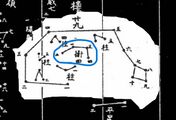Heng: Difference between revisions
Boshunyang (talk | contribs) |
Boshunyang (talk | contribs) |
||
| Line 2: | Line 2: | ||
==Etymology and History== |
==Etymology and History== |
||
Heng is a general term for measuring instruments that weigh objects, and it also refers to the graduated arm of a steelyard weighing apparatus. As a verb, it means to weigh, and it is further extended to evaluate certain things or people. As a constellation , 'Heng' is a small one consisting of four stars located within [[Kulou]]. The astrological text ''Jin Shu - Astronomical Treatise'' mentions: "The four small stars in the center (of Kulou) are Heng, which is mainly for deploying troops." Perhaps for this reason, Sun & Kistemaker interprets it as 'a place for drilling and examining soldiers'. However, [[Kulou|Kulou and Zhu]] are both nouns. From this perspective, Heng may also be a noun, and it may originally represent a tool for measuring the weight or quality of weapons. |
Heng is a general term for measuring instruments that weigh objects, and it also refers to the graduated arm of a steelyard weighing apparatus. As a verb, it means to weigh, and it is further extended to evaluate certain things or people. As a constellation , 'Heng' is a small one consisting of four stars located within [[Kulou]]. The astrological text ''Jin Shu - Astronomical Treatise'' mentions: "The four small stars in the center (of Kulou) are Heng, which is mainly for deploying troops."<ref>Fang Xuanling房玄龄. ''Book of Jin''晋书. Beijing: Zhonghuashuju. 1974. p304.</ref> Perhaps for this reason, Sun & Kistemaker interprets it as 'a place for drilling and examining soldiers'.<ref>Sun Xiaochun. & Kistemaker J. ''The Chinese sky during the Han''. Leiden: Brill. 1997, p154.</ref> However, [[Kulou|Kulou and Zhu]] are both nouns. From this perspective, Heng may also be a noun, and it may originally represent a tool for measuring the weight or quality of weapons. |
||
===Identification of stars=== |
===Identification of stars=== |
||
| Line 54: | Line 54: | ||
|} |
|} |
||
===Maps |
===Maps=== |
||
<gallery widths="200" perrow="3" caption="Heng"> |
|||
File:Heng in Cheonsang Yeolcha Bunyajido.jpeg|Heng in Cheonsang Yeolcha Bunyajido |
|||
File:Heng in Geziyuejintu.jpeg|Heng in Geziyuejintu |
|||
File:Heng in Suzhou Star Map.jpeg|Heng in Suzhou Star Map |
|||
</gallery> |
|||
==Star Name Discussion (IAU)== |
==Star Name Discussion (IAU)== |
||
Revision as of 14:05, 5 March 2025
A Chinese constellation within the super-constellation of Kulou (库楼), the Arsenal.
Etymology and History
Heng is a general term for measuring instruments that weigh objects, and it also refers to the graduated arm of a steelyard weighing apparatus. As a verb, it means to weigh, and it is further extended to evaluate certain things or people. As a constellation , 'Heng' is a small one consisting of four stars located within Kulou (库楼). The astrological text Jin Shu - Astronomical Treatise mentions: "The four small stars in the center (of Kulou) are Heng, which is mainly for deploying troops."[1] Perhaps for this reason, Sun & Kistemaker interprets it as 'a place for drilling and examining soldiers'.[2] However, Kulou and Zhu are both nouns. From this perspective, Heng may also be a noun, and it may originally represent a tool for measuring the weight or quality of weapons.
Identification of stars
Due to the relatively obvious position, sufficient brightness, and relatively regular shape of Heng, it has remained unchanged for two thousand years.
| Star Names or Orders(Traditional/Qing) | Ho PENG YOKE[3] | Yi Shitong[4]
Based on catalogue in 18th century |
Pan Nai[5]
based on Xinyixiangfayao Star Map |
SUN X. & J. Kistemaker[6]
Han Dynasty |
Boshun Yang[7]
before Tang dynasty |
Boshun Yang[7]
Song Jingyou(1034) |
|---|---|---|---|---|---|---|
| 1st/determinative | nu Cen | nu Cen | nu Cen | nu Cen | nu Cen | nu Cen |
| 2nd | mu Cen | mu Cen | mu Cen | mu Cen | mu Cen | mu Cen |
| 3rd | phi Cen | phi Cen | phi Cen | phi Cen | phi Cen | phi Cen |
| 4th | chi Cen | chi Cen | chi Cen | chi Cen | chi Cen | chi Cen |
Maps
- Heng
Star Name Discussion (IAU)
In 2025, the name of the historical constellation "xxx" was suggested to be used for one of the stars in this constellation. ...
Decision: ...
References
- ↑ Fang Xuanling房玄龄. Book of Jin晋书. Beijing: Zhonghuashuju. 1974. p304.
- ↑ Sun Xiaochun. & Kistemaker J. The Chinese sky during the Han. Leiden: Brill. 1997, p154.
- ↑ P.-Y. Ho, “Ancient And Mediaeval Observations of Comets and Novae in Chinese Sources,” Vistas in Astronomy, 5(1962), 127-225.
- ↑ Yi Shitong伊世同. Zhongxi Duizhao Hengxing Tubiao中西对照恒星图表1950. Beijing: Science Press.1981: 56.
- ↑ Pan Nai潘鼐. Zhongguo Hengxing Guance shi中国恒星观测史[M]. Shanghai: Xuelin Pree. 1989. p226.
- ↑ Sun Xiaochun. & Kistemaker J. The Chinese sky during the Han. Leiden: Brill. 1997, Pp241-6.
- ↑ 7.0 7.1 B.-S. Yang杨伯顺, Zhongguo Chuantong Hengxing Guance Jingdu ji Xingguan Yanbian Yanjiu 中国传统恒星观测精度及星官演变研究 (A Research on the Accuracy of Chinese Traditional Star Observation and the Evolution of Constellations), PhD thesis, (Hefei: University of Science and Technology of China, 2023). 261.







